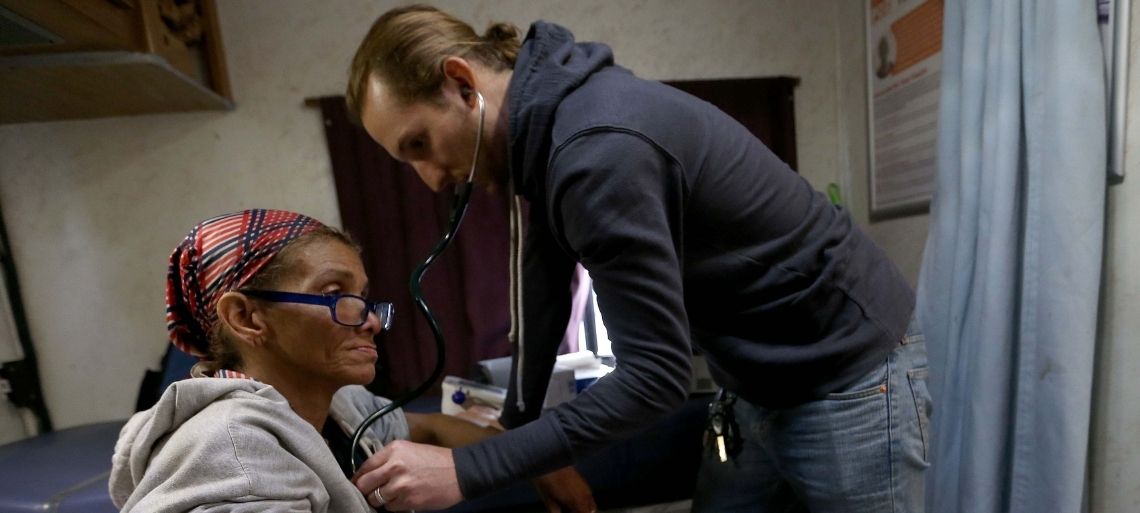Stritch alum meets patients wherever they are
Dr. Jason Reinking (MD ‘11) reflects on Street Medicine, Stritch experience
Before he became a Stritch School of Medicine student, Jason Reinking knew he wanted to work with people living on the margins. At Stritch, he learned the concepts of accessibility and accompaniment. He continues to be guided by those principles in his work with patients today.
Dr. Reinking completed a fellowship with Partners in Health in Malawi after graduation. Returning home to California, a friend introduced him to a position in Street Medicine. Reinking says Street Medicine is “building out the provision of care directly to people experiencing homelessness at the place where they reside.” Around 2015, Reinking began providing care to people experiencing homelessness, who usually lived in encampments lacking basic necessities, like plumbing, electricity, and sanitation. In 2020, Loyola developed a Street Medicine program which improves access to various types of care for west suburban and Chicago area residents facing housing insecurity.
Seven years later and now Medical Director for the LifeLong Trust Health Center and its Street Medicine program in Berkeley, California, Reinking has maintained relationships with patients he met when he started practicing Street Medicine. He credits these ongoing relationships to his clinic’s decision not to “graduate” its patients once they find permanent housing. Because many people experiencing homelessness go through periods of housing stability, Reinking said his team made a decision to work with patients over the long term so even if patients found permanent housing, they would continue to be seen by the Street Medicine team.
During the COVID-19 pandemic, California’s housing crisis continued to worsen. Even with government efforts to provide permanent housing for some Californians, more people are newly homeless than people who have found housing. Another by-product of the pandemic: the significant increase in the incidence of substance use disorders and overdoses. For example, in San Francisco, Reinking has seen, first-hand, that more people have died from fentanyl overdoes than from COVID-19. With approximately 1,800 to 2,000 patients at LifeLong Trust Health Center, about 30 to 40 patients die each year. Reinking estimates roughly half are drug overdoses.
To curb the morbidity of homelessness, the clinic aims to “leverage urgent care towards primary care,” said Reinking. By listening to patients’ most pressing concerns and acting on them quickly (rather than referring a patient to a physician outside of the clinic), Reinking’s team can build strong relationships with their patients and better provide care over the long-term. Integrating primary and behavioral health and addiction care in a single clinic, and bringing in optometry and dental care, makes the clinic an accessible solution for all forms of care.
LifeLong Trust Health Center physicians and staff take pride in the practice of accompaniment. “A case manager will walk with a patient where they want to walk, not according to where a health system says they should go,” said Reinking. By providing patients with a full scope of knowledge from their physical and mental health exams, they are empowered to make their own health care decisions.
Outreach is an essential part of accompaniment. People who experience homelessness only will seek medical care when it impacts their ability to survive, and by that time, it is often too late.
Reinking credits the clinic’s community system of care which enables it to provide care to patients. This community of healthcare professionals can identify with its patient population across age, race, gender, and lived experience, which is crucial for effective outreach. For families experiencing homelessness, parents often fear that receiving services will result in being separated from their children. One of the biggest “wins” for Reinking's team is building a relationship with a family that will ultimately lead to an upward healthcare and housing trajectory. For Reinking, building a patient relationship through accompaniment is just as important as providing care.
This sentiment rings true with Reinking’s Stritch education, as he recalls the Bible verse adorned on a wall of the Stritch atrium, “I was ill, and you cared for me.” He notes that the verse does not say “cured,” but instead reminds him of the palliative care he practices every day. The Jesuit values that inform Stritch’s dedication to service, not only motivated Reinking to apply but also led to the creation of the Center for Community and Global Health during his second year at Stritch. “I am forever indebted to that group of students who were very passionate about creating an entire programming department for underserved medicine,” he said.
